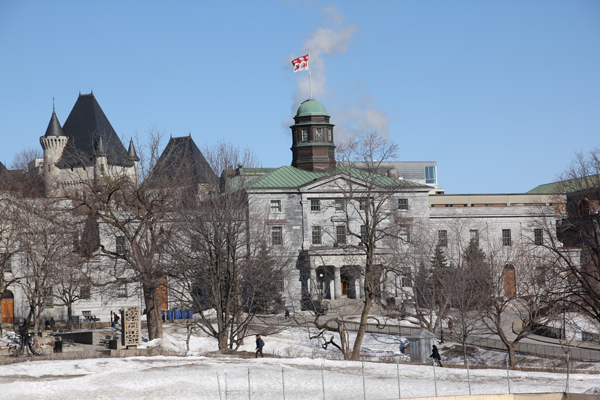
Thanks to a prudent approach, McGill is well-positioned to face a challenging year, Masi tells Senate
By Mark Ordonselli
Provost Anthony C. Masi gave Senate an overview of McGill’s financial situation on Wednesday that predicts budget cuts of 2 to 3 per cent on average for academic and administrative units, respectively, and a deficit in the next fiscal year of about $14 million.
For the current fiscal year, which ends April 30, McGill’s finances are in relatively good shape, Masi said. That’s largely thanks to cost-cutting measures implemented last fall, and to a $15-million contingency fund set aside last April in case the provincial government made deeper cuts to post-secondary education spending.
“We took some bitter medicine when we did the first round of cuts” last year, Masi said, but because of this approach, McGill’s FY2015 operating deficit is likely to be roughly $7 million – still not a balanced budget, but impressive, given the $20-million in mid-year cuts imposed by the Quebec government.
“We predicted the cuts and we prepared accordingly,” Masi said. As a result, “we’re able to navigate better than most [Quebec] universities because we haven’t shied away from taking difficult decisions.
“Our sister universities now need to cut deeper.”
As well, McGill’s spending restraint has left the University well-positioned to honour its salary commitments to all employees, at a cost of approximately $20 million in FY2016.
More government cuts ahead
The Quebec government has already warned universities to expect a fresh round of cuts in FY2016, Principal Suzanne Fortier said at Senate. “Though hopefully not as high as the ones we had this year, there will be a further reduction in our budget.”
The full extent of those cuts likely won’t be known for some time. The government will likely provide preliminary indications about funding levels sometime in May – about a month after McGill has to present its budget for the year to the Board of Governors – but definitive funding numbers won’t be provided until the fall, half-way through the fiscal year.
To help safeguard the University’s finances through an uncertain year, and in anticipation of a fresh round of government cuts, Masi announced the following new cost-saving measures – together, they’ll reduce McGill’s expenses by approximately $16 million.
- An average cut of 2 per cent in the budgets of academic units and 3 per cent in administrative units
- The continuation of a freeze on external hires for administrative and support staff positions, that had been implemented in October 2014
- The central recuperation of salaries liberated when employees leave their positions
- The suspension of overtime payments, except when such work is essential
- A re-design of the policy and practices governing job re-classifications
- Changes to the policy governing how units’ budget surpluses carry forward from year to year
Masi also reaffirmed that McGill must decrease its complement of administrative and support employees but will do so through attrition, saying, “we’re not doing anything more radical than that.”
Modernizing our infrastructure
During the budget discussion, Masi highlighted the critical deferred maintenance issues that threaten several McGill buildings – many of which are more than a century old and in need of extensive work. “We’ve reached the point at McGill where it’s not only embarrassing,” he said, “but potentially dangerous. We can’t afford that.”
To address this, Masi announced new infrastructure allocations of up to $11.5 million per year and noted that, “that may have to go up.”
Looking toward the future
Barring deep new unforeseen cuts, Masi said he expects the FY2016 budget to be part of “a platform that will allow the university to balance its books within five years.” He and Principal Fortier also pointed to some possible causes for optimism on the horizon, such as potential changes to Quebec’s university funding model in FY2017, and low interest rates that make McGill’s debts easier to manage for the time being.
But Masi offered a word of caution, warning that year-on-year deficits resulting from chronic government underfunding could eventually saddle McGill with painful debts – especially if interest rates begin to increase. He highlighted the need to halt the growth of the University’s accumulated deficit – currently around $120 million – because “at some point, we’re going to have to pay this back.”
